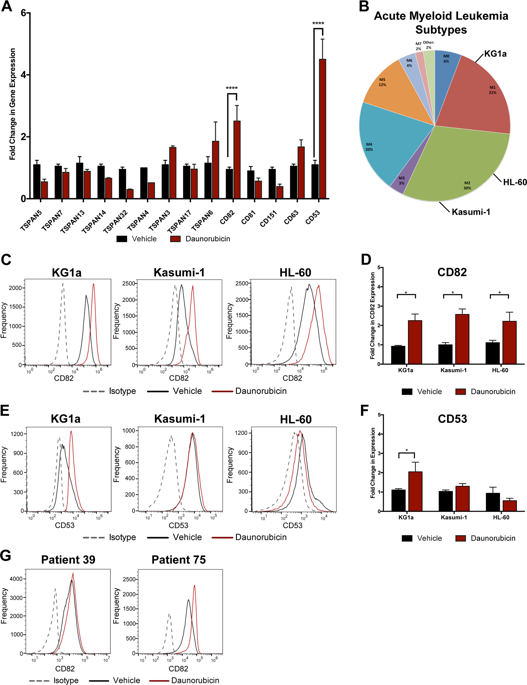Our official English website, www.x-mol.net, welcomes your feedback! (Note: you will need to create a separate account there.)
Tetraspanin CD82 drives acute myeloid leukemia chemoresistance by modulating protein kinase C alpha and β1 integrin activation.
Oncogene ( IF 8 ) Pub Date : 2020-03-19 , DOI: 10.1038/s41388-020-1261-0 Muskan Floren 1 , Sebastian Restrepo Cruz 1 , Christina M Termini 1 , Kristopher D Marjon 1 , Keith A Lidke 2, 3 , Jennifer M Gillette 1, 3
Oncogene ( IF 8 ) Pub Date : 2020-03-19 , DOI: 10.1038/s41388-020-1261-0 Muskan Floren 1 , Sebastian Restrepo Cruz 1 , Christina M Termini 1 , Kristopher D Marjon 1 , Keith A Lidke 2, 3 , Jennifer M Gillette 1, 3
Affiliation

|
A principal challenge in treating acute myeloid leukemia (AML) is chemotherapy refractory disease. As such, there remains a critical need to identify key regulators of chemotherapy resistance in AML. In this study, we demonstrate that the membrane scaffold, CD82, contributes to the chemoresistant phenotype of AML. Using an RNA-seq approach, we identified the increased expression of the tetraspanin family member, CD82, in response to the chemotherapeutic, daunorubicin. Analysis of the TARGET and BEAT AML databases identifies a correlation between CD82 expression and overall survival of AML patients. Moreover, using a combination of cell lines and patient samples, we find that CD82 overexpression results in significantly reduced cell death in response to chemotherapy. Investigation of the mechanism by which CD82 promotes AML survival in response to chemotherapy identified a crucial role for enhanced protein kinase c alpha (PKCα) signaling and downstream activation of the β1 integrin. In addition, analysis of β1 integrin clustering by super-resolution imaging demonstrates that CD82 expression promotes the formation of dense β1 integrin membrane clusters. Lastly, evaluation of survival signaling following daunorubicin treatment identified robust activation of p38 mitogen-activated protein kinase (MAPK) downstream of PKCα and β1 integrin signaling when CD82 is overexpressed. Together, these data propose a mechanism where CD82 promotes chemoresistance by increasing PKCα activation and downstream activation/clustering of β1 integrin, leading to AML cell survival via activation of p38 MAPK. These observations suggest that the CD82-PKCα signaling axis may be a potential therapeutic target for attenuating chemoresistance signaling in AML.
中文翻译:

四跨膜蛋白CD82通过调节蛋白激酶Cα和β1整联蛋白激活来驱动急性髓细胞白血病化学耐药性。
治疗急性髓细胞性白血病(AML)的主要挑战是化疗难治性疾病。因此,迫切需要确定AML化疗耐药性的关键调控因子。在这项研究中,我们证明膜支架CD82有助于AML的化学耐药表型。使用RNA序列方法,我们确定了响应化学疗法柔红霉素的四跨膜家族成员CD82的表达增加。TARGET和BEAT AML数据库的分析确定了CD82表达与AML患者的总生存率之间的相关性。此外,使用细胞系和患者样品的组合,我们发现CD82的过表达导致响应化学疗法的细胞死亡显着减少。对CD82促进化学疗法应答AML生存的机制的研究确定了增强蛋白激酶cα(PKCα)信号传导和β1整联蛋白下游激活的关键作用。另外,通过超分辨率成像对β1整联蛋白簇的分析表明,CD82表达促进了致密的β1整联蛋白膜簇的形成。最后,柔红霉素治疗后对生存信号的评估确定了CD82过表达时,PKCα下游的p38丝裂原活化蛋白激酶(MAPK)和β1整合素信号的强烈激活。总之,这些数据提出了一种机制,其中CD82通过增加PKCα激活和β1整联蛋白的下游激活/簇集来促进化学抗性,从而通过激活p38 MAPK导致AML细胞存活。
更新日期:2020-03-19
中文翻译:

四跨膜蛋白CD82通过调节蛋白激酶Cα和β1整联蛋白激活来驱动急性髓细胞白血病化学耐药性。
治疗急性髓细胞性白血病(AML)的主要挑战是化疗难治性疾病。因此,迫切需要确定AML化疗耐药性的关键调控因子。在这项研究中,我们证明膜支架CD82有助于AML的化学耐药表型。使用RNA序列方法,我们确定了响应化学疗法柔红霉素的四跨膜家族成员CD82的表达增加。TARGET和BEAT AML数据库的分析确定了CD82表达与AML患者的总生存率之间的相关性。此外,使用细胞系和患者样品的组合,我们发现CD82的过表达导致响应化学疗法的细胞死亡显着减少。对CD82促进化学疗法应答AML生存的机制的研究确定了增强蛋白激酶cα(PKCα)信号传导和β1整联蛋白下游激活的关键作用。另外,通过超分辨率成像对β1整联蛋白簇的分析表明,CD82表达促进了致密的β1整联蛋白膜簇的形成。最后,柔红霉素治疗后对生存信号的评估确定了CD82过表达时,PKCα下游的p38丝裂原活化蛋白激酶(MAPK)和β1整合素信号的强烈激活。总之,这些数据提出了一种机制,其中CD82通过增加PKCα激活和β1整联蛋白的下游激活/簇集来促进化学抗性,从而通过激活p38 MAPK导致AML细胞存活。



























 京公网安备 11010802027423号
京公网安备 11010802027423号